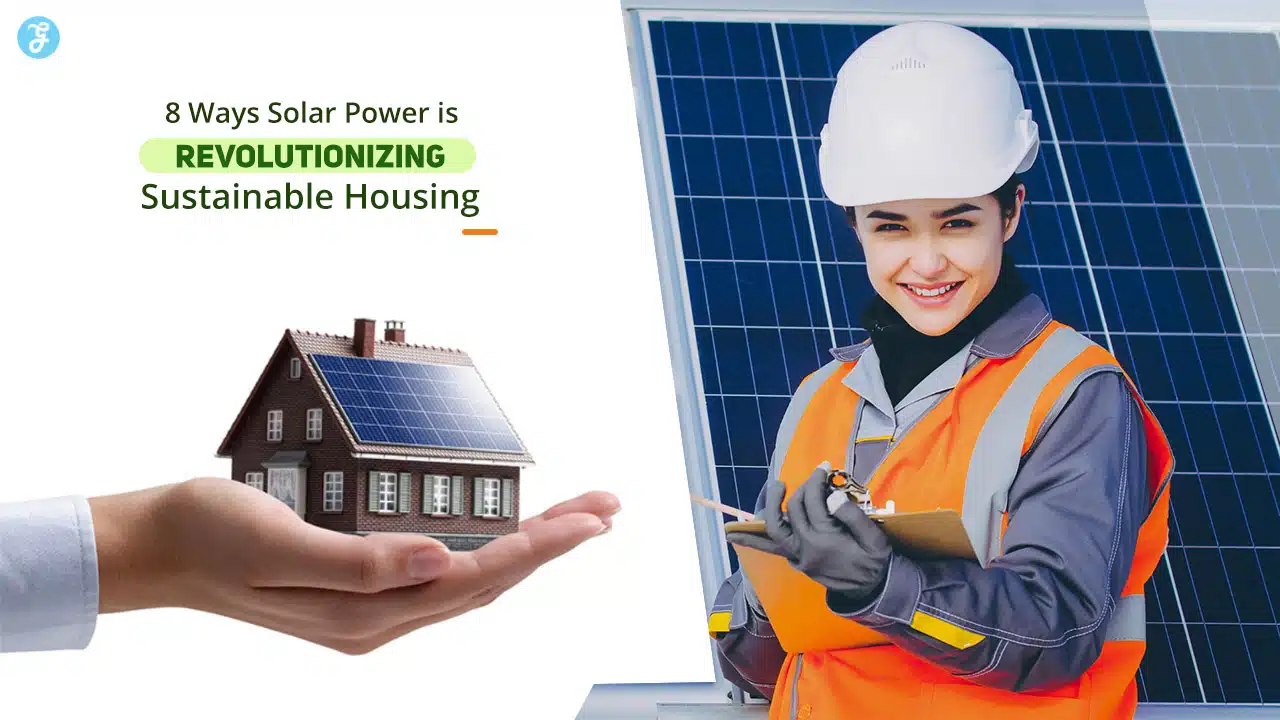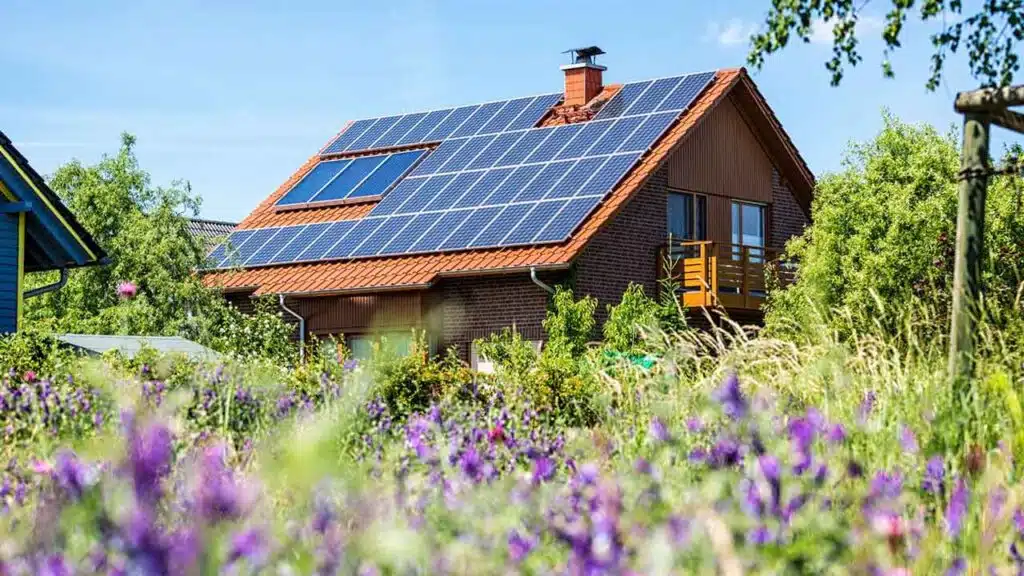Solar power has emerged as a cornerstone of the global push towards sustainable living, particularly in housing.
As homeowners seek eco-friendly alternatives to traditional energy sources, solar technology is driving innovation and transforming how we design, build, and live in homes.
From reducing carbon footprints to enabling energy independence, solar power offers myriad benefits.
Here are 8 ways solar power is revolutionizing sustainable housing, making it more efficient, affordable, and environmentally friendly.
1. Enhancing Energy Independence
Energy independence is one of the most empowering benefits of solar power. By generating electricity on-site, homeowners can significantly reduce their reliance on external energy providers.
This means that homes equipped with solar panels are less affected by energy price fluctuations and supply disruptions. Battery storage systems enhance this independence further, allowing homeowners to store excess energy for use during nighttime or outages.
Solar power is particularly valuable in rural areas of Australia, Europe, and North America, where grid connectivity can be inconsistent. Beyond financial savings, energy independence promotes self-reliance, making solar-powered homes more resilient and future-ready.
| Key Benefits | Details |
| Lower Dependency on Grid | Reduced reliance on fossil fuel-based energy |
| Cost Savings | Lower utility bills |
| Resilience | Backup power during outages with battery storage |
2. Reducing Carbon Footprints
Reducing carbon emissions is at the heart of solar power’s contribution to sustainable housing. Traditional energy sources, such as coal and natural gas, release significant greenhouse gases during production, contributing to global warming.
Solar power, on the other hand, is a clean and renewable energy source, producing no harmful emissions during operation. By transitioning to solar, homeowners can drastically lower their environmental impact.
Over its lifetime, a single solar panel system can offset several tons of CO2 emissions. This aligns with global sustainability goals and supports efforts to combat climate change, making solar power a critical component of eco-friendly housing.
| Key Benefits | Details |
| Clean Energy Source | Solar power produces no harmful emissions |
| Climate Change Mitigation | Reduces reliance on coal and gas power |
| Sustainable Living | Encourages eco-friendly practices |
3. Driving Down Energy Costs
While installing solar panels requires an initial investment, the long-term savings are substantial. Solar power allows homeowners to generate their own electricity, effectively reducing monthly utility bills.
With advancements in technology and government incentives like tax credits and rebates, the cost of solar panel installations has decreased significantly in recent years. For instance, countries like the US and Germany offer programs that reimburse homeowners for surplus energy fed back into the grid.
Over the system’s lifespan, these financial benefits far outweigh the initial setup costs, making solar an economically viable solution for those aiming to reduce their overall energy expenses.
| Key Benefits | Details |
| Lower Utility Bills | Generate free energy from the sun |
| Tax Incentives | Federal and local rebates reduce installation costs |
| Return on Investment (ROI) | High savings over the system’s lifetime |
4. Integrating Solar into Smart Home Technology
The synergy between solar power and smart home technology is revolutionizing energy efficiency in modern housing. Smart devices, such as thermostats, energy monitors, and automated lighting systems, optimize energy usage by responding to real-time solar production.
For example, surplus energy generated during the day can be directed towards powering high-energy appliances or charging electric vehicles. Solar management apps provide homeowners with detailed insights into their energy consumption patterns, enabling them to make informed decisions about resource allocation.
This integration not only enhances convenience but also ensures that every unit of solar energy is utilized efficiently, maximizing both savings and sustainability.
| Key Benefits | Details |
| Energy Monitoring | Apps track solar production and consumption |
| Automated Systems | Devices adjust energy use based on demand |
| Improved Efficiency | Minimizes waste and maximizes output |
5. Increasing Property Values
Homes equipped with solar power systems are becoming highly desirable in today’s real estate market. Buyers are increasingly attracted to properties that promise lower utility costs and reduced environmental impact.
Research shows that solar-powered homes often sell faster and at higher prices compared to those without. For sellers, this means a higher return on investment for installing solar panels.
Additionally, as governments and organizations advocate for greener living, solar-integrated properties align with future housing standards. This growing demand ensures that solar power remains a valuable asset for homeowners, both financially and environmentally, making it a smart addition to any property.
| Key Benefits | Details |
| Higher Resale Value | Solar-equipped homes attract premium offers |
| Market Demand | Growing preference for sustainable properties |
| Long-Term Appeal | Solar technology remains valuable over decades |
6. Promoting Off-Grid Living
Off-grid living is no longer limited to remote cabins and eco-resorts. Solar power makes it possible for regular homes to operate independently of traditional utility grids.
With advancements in battery storage technology, homeowners can store excess solar energy to power their homes even during cloudy days or nighttime.
This capability is particularly advantageous in areas prone to natural disasters or those with unreliable grid access. By embracing off-grid living, homeowners not only achieve energy self-sufficiency but also contribute to sustainability by reducing the demand on centralized energy systems.
This marks a significant step towards decentralized and eco-friendly housing solutions.
| Key Benefits | Details |
| Self-Sufficiency | Completely independent energy supply |
| Remote Access | Brings power to areas without grid connectivity |
| Eco-Friendly Lifestyle | Encourages minimal environmental impact |
7. Inspiring Innovative Housing Designs
Solar power is driving innovation in architectural design and construction, creating homes that seamlessly integrate sustainability with aesthetics.
Modern advancements, such as solar roof tiles and transparent solar windows, allow architects to incorporate solar energy systems without compromising design appeal. These innovations make it easier to create homes that are both energy-efficient and visually stunning.
Additionally, passive solar design techniques, like strategically positioning windows and panels, maximize sunlight exposure for heating and electricity generation. By pushing the boundaries of traditional design, solar technology is shaping a new era of housing that blends functionality, sustainability, and beauty.
| Key Benefits | Details |
| Architectural Flexibility | Integrates solar solutions into modern designs |
| Aesthetic Appeal | Sleek and unobtrusive solar options available |
| Custom Solutions | Tailored to specific housing needs |
8. Facilitating Energy Sharing through Solar Communities
Solar energy is paving the way for collaborative energy systems through shared solar communities.
These communities use microgrids to distribute surplus energy generated by individual households among neighbors, fostering collective energy independence. Homeowners with excess solar power can sell or share their energy, reducing costs for the entire community.
This model not only encourages sustainable living but also strengthens social bonds by promoting collaboration. As more neighborhoods adopt solar community models, the concept of localized, sustainable energy production is becoming a reality, showcasing solar power’s potential to revolutionize not just homes but entire communities.
| Key Benefits | Details |
| Shared Resources | Redistributes surplus energy locally |
| Lower Collective Costs | Reduces overall energy expenses |
| Community Engagement | Promotes collaborative sustainable practices |
Wrap Up
Solar power is revolutionizing sustainable housing in ways that go beyond energy generation. From reducing carbon footprints to fostering energy independence and community collaboration, solar technology is a game-changer in the housing industry.
By embracing these innovations, homeowners can not only save money but also contribute to a greener, more sustainable future.
As solar power continues to evolve, its role in transforming housing will only grow, making it an indispensable element of modern living







































